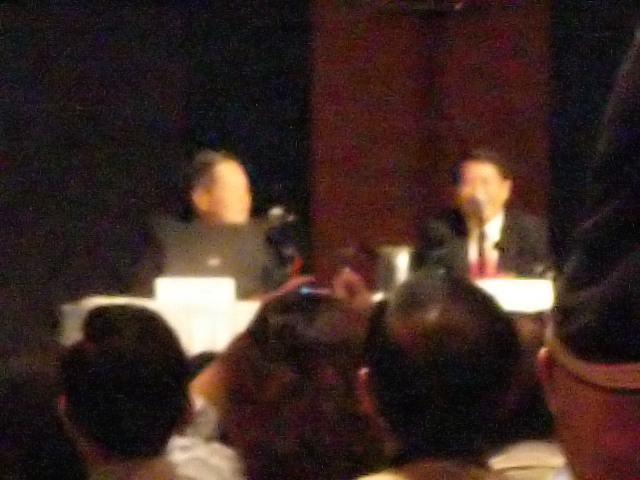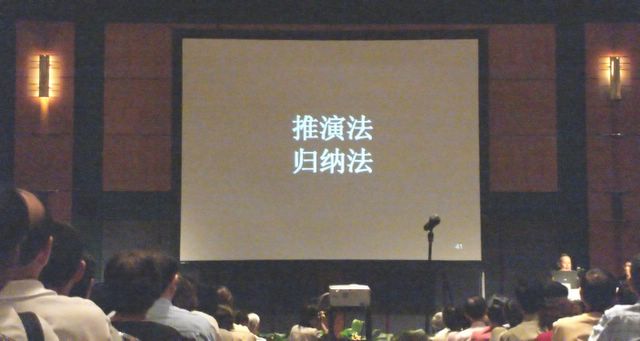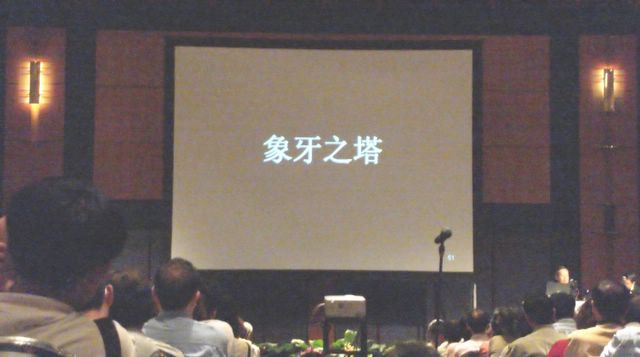 Nobel Uncle Lecture.
Nobel Uncle Lecture.Last week I went with my friend to a Nobel uncle lecture, given by Chinese particle physicist Prof. Yang Chen Ning (pinyin: Yang Zhenning 杨振宁).
Now you might think -"Wah, that's something special!" Not really. I've already heard a couple of Nobel uncle lectures (Doug Osheroff, Kurt Wuthrich) and met two Nobel uncles in person (Sydney Brenner, Ferid Murad). It's actually not hard to get a chance to meet any Nobel uncle or auntie, since there have been 758 awardees since 1901. They are everywhere!
Okay so that's only a tinsy fraction of the total number of scientists, writers, peace activists and economists in the whole wide world. So what. The fact remains that something like a dozen Nobel laureattes stop by Singapore every year. Just read the newspapers and you can go attend any one of those lectures. It's a snap.
You're thinking to yourself, "this guy doesn't think much of Nobel laureattes! Does he not know how important they are? He is an idiot!"
First of all let me state this clearly. Just because I'm an idiot doesn't mean I'm wrong.
Secondly let me say that just because something is very difficult doesn't mean that it has to be important.
There are nice Nobel uncles and nasty Nobel uncles. Happy uncles and angry uncles. Workaholic uncles and lucky uncles. And aunties. Such a varied bunch! Their "importance" comes from their work. Not from the medal that a Swedish uncle gives to a Swedish uncle.
Thus I can only like the Nobel uncles/aunties whose work I understand, and can appreciate its significance. I don't go around worshipping people or things I don't understand simply because they're too difficult to understand.
As I was saying, I did go with my friend for this talk not because it's about a Nobel uncle. But because it's the first time I get to hear a Nobel uncle give a talk in Mandarin. And also because it's about his life, which is fluffy stuff and doesn't require a physics degree as a prerequisite. So off we went!
Before I start let me mention that my friend has a much better selection of photos than mine. If you can read Chinese, pop over to his blog where he has a more comprehensive coverage of the talk. I provide an English description here, but it is different from my friend's since we are interested in different aspects of the talk. I concentrate only on the fluffy bits, obviously. Tee hee.

Although we arrived 15 minutes early, the venue was jam-packed with people. The seats were completely filled and people were stuck standing at the back or sitting on the ground. The first thing that hits me was - there were a lot of Chinese nationals in attendance. I also see many old uncles and aunties everywhere. In the audience a smattering of students in uniform can also be seen. We have quite a crowd.
The second thing I noticed, was the announcer. She was apologising repeatedly for the inadequate size of the hall. But what really annoys me was her fawning over Prof. Yang. She kept reminding that audience how this is a special visit by Prof. Yang, how he set aside his precious time to come for the talk, how he already gave talks in the morning and is very tired, what an immense effort from an old gentleman... blah blah blah.
Her icky subservience disturbs me.

Prof. Yang and Prof. Xu of NTU arrived on schedule. The venue was fairly dark and we were far away, so I didn't catch a good photo of the two, but well, you can always wiki better portraits of them.
Prof. Yang started by describing his childhood. He emphasized how simple his beginnings were, born in 1922 at a rural town in Anhui province with no 20th century amenities. He noted that he did not encounter modern life until their family moved to Xiamen in 1928.
I immediately saw a disparity (apologies to Prof. Yang for the pun). He was actually much more fortunate than he wished to portray. His father was a US-trained mathematics professor! How lucky is that? My dear readers, which one of you has a relative who was a professor in the 1920s? I certainly don't! In the 1920s my grandfather (Ah Kong in Hokkien) was struggling just to eke out a living in China. He never had any chance to go to school.
Next, Prof. Yang talked about his family moving from place to place as his father obtained professorships in different universities. In 1937, a violent change was about to occur. The Japanese invasion of northeast China forced his family to be on the run for some time before they settled down in Kunming.
Once there he had an opportunity to enrol in the National Southwest Associated University at the tender age of 15 years. He emphasized once again, the poor conditions he had to endure to complete his studies during wartime China. He showed a photo of hastily constructed classrooms, with dried hay as makeshift roofing material. He remarked that even a mere bowl of nuts and a cup of tea was a luxury at that time.
Again I have a different appraisal of his situation. It is definitely true that his college life experience completely sucks relative to, say, mine. But relative to the millions of young men who went to resist the Japanese invasion at that time? Dying by the thousands, because they were under-fed, under-equipped and utterly out-numbered by the enemy?
He is a lucky man.

Eventually he obtained his bachelor's and master's degree in wartime China. After the war, he went overseas to the University of Chicago under the tutelage of Enrico Fermi, the world-class veteran physicist who would be a major influence in his career. He mentioned that in the US he encountered a different approach to science, as shown in the above photo.
My friend thinks Prof. Yang encountered 推演法 (which I translated as inductive reasoning) in the US.
I think that Prof. Yang encountered 归纳法 (hypothetico-deductive reasoning) in the US, since this new approach was popular among scientists such as Einstein, who used thought experiments (Gedanken) and mathematics to first generate physical models, long before technologies exist to actually test them.
Which one is correct? You don't really give a shit? Oops.
Sorry I got carried away. Back to the fluff!

Here's a photo of Einstein with Prof. Yang's son, taken in 1955. This was the second photo of Einstein shown in the talk. I put it up to illustrate a point.
During the talk, Prof. Yang said he admired three physicists very much as an undergraduate. The first face to come up was Albert Einstein's.
Immediately, you can hear the audience gasp with an "oooooh" sound. As if they just saw the face of God. You should've been there man, that's really cool shit. Einstein has become so instantly recognisable that even old uncles and aunties revere him. Without really understanding what he actually did to become so famous. Einstein himself would be rather disconcerted at all this hero-worshipping. Hah!
Anyway, later when pictures of Teller, Fermi and Oppenheimer appeared, there were no further gasps from the audience. Oh well, so Einstein does have a higher social rank than the rest of them.
Yeah, I'm really picky. *snicker*

You know, I'm not always a contrarian. Towards the end of his talk, Prof. Yang tried to explain in retrospect why the scientists at Chicago were so successful. One main reason was because their institute was an 象牙之塔 (ivory tower), where scientists can concentrate on their research work alone without being bothered with teaching and adminstrative responsibilities. I superduper 100% agree with this observation.
Why am I so quick to support his view? Because when I was in junior college, I had a minor "discussion" with an administrator over my interest in Science. I told him I was not interested in other subjects, and he rebuked me, saying that I was just living in my ivory tower. Like in a cocky, out-of-touch sort of way. Very funny.
So then, if you are reading this now, Mr. Admin, how many important discoveries have you made in the field of paper-pushing? And roughly how many Admin "Nobel" Prizes have you won, sir?
That fucker.

Oooh, I've come to the juiciest part of the lecture. If you have been following the Chinese media lately, Prof. Yang has been the talk of town for marrying a 28-year old woman just last year. At the age of 82. Obviously a significant age gap. The gossip that has been going around has been generally negative. After a thorough analysis of the situation, I have just one message for those who are critical of their marriage.
FUCK OFF.
There. I've defended a Nobel uncle. A very lucky Nobel uncle, in fact.
Happy now?






6 Comments:
shucks, how did SHE manage to hook him???? nobel prize should go to her man..........
They met in China in'95. Along's blog has that picture of Prof. Yang with his then wife, and his future wife.
I think both his wives are hot babes.
Your are Excellent. And so is your site! Keep up the good work. Bookmarked.
»
Can't believe you guys are defending this kind of 'marrying 60 years younger than me' action! GROSS
Meh. What Nobel uncles and aunties do with their free time is not my problem. This is Weng Fan's second marriage, so I'm assuming she knows what she's doing.
Besides, talking about gross stuff is a staple of Fresh Brainz! Did I show you what I dug out of my nose this morning?
One main reason was because their institute was an 象牙之塔 (ivory tower), where scientists can concentrate on their research work alone without being bothered with teaching and adminstrative responsibilities.
Uhh, things must have changed a lot since Yang was there. Nowadays all U of C graduate students have to do a year or two of teaching (more if they are theorists). Professors teach and do administrative work about as much as is typical in other research universities. Only post-docs are exempt. Chicago is an ivory tower insofar as it is more unconcerned than other institutions about financial gains from research. This is reflected in how it has no engineering department. Scientific research at Chicago is conducted primarily on the basis of scientific importance, not monetary gains.
Post a Comment